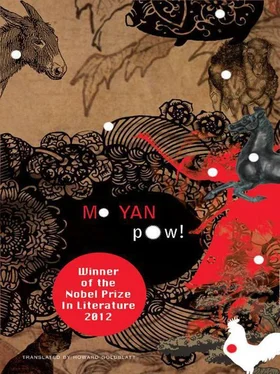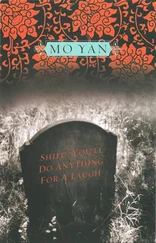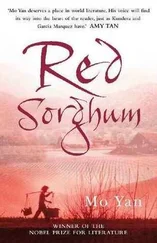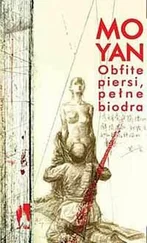‘No,’ I insisted, refusing to let go. ‘I want you to come with me, Dieh.’
‘Let go,’ he began sternly but then grew forlorn. ‘Son,’ he said, ‘A man needs dignity the way a tree needs bark. Your dieh has fallen on hard times but he's still a man, and what your mother said is true—a good horse doesn't graze the land behind it.’
‘But she apologized!’
‘Son!’ I could see his mood darkening. ‘A man's heart is easily bruised, like the roots of a tree.’ He yanked the satchel out of my hand and waved his hand towards the exit. ‘Go now, and do as your mother says.’
‘Dieh,’ I sobbed, tears gushing from my eyes, ‘don't you want us any more?’
His eyes were moist as he looked at me. ‘That's not it, my boy, that's not what this is about. You've got a good head on your shoulders, I don't have to explain things to you.’
‘Yes, you do!’
‘Go, now,’ he said decisively. ‘Go, and stop bothering me!’ He picked up his satchel, pulled Jiaojiao to her feet and took a quick look round, as if to find a better place to sit. Everyone was looking at us, agog with curiosity, but he didn't care. He picked up Jiaojiao and moved her to a rickety slat bench by the window. Before he sat down, he fixed his bulging eyes on me. ‘What are you hanging round for?’ he bellowed.
I backed up fearfully. He'd never spoken to me like that, at least not that I could recall. I turned and looked at the door behind me, wishing Mother could tell me what to do. But it was shut tight and not in the least welcoming. Only a few snowflakes blew in through the cracks.
A middle-aged woman in a blue uniform and a stiff hat walked into the waiting room with a red battery-powered bullhorn. ‘Tickets! Tickets! All passengers for Train 384 to the Northeast Provinces line up with your tickets.’
The passengers scrambled to their feet, tossed their bundles over their shoulders and lined up to have their tickets punched. The two men gulped down what remained in their bottles, gobbled up the last of the pigs’ ears, wiped their greasy mouths, then belched and staggered up to the gate. Father fell in behind them, carrying Jiaojiao.
I stood there staring at their backs, wishing he'd turn to see me one more time. I refused to believe that he could walk away from me so easily. But he didn't turn, and I stood there, unable to take my eyes off his overcoat, so dirty and greasy it shone, like a wall in a butcher's house. But Jiaojiao, whose little face poked up over his shoulder, sneaked a look at me. The ticket-collector was waiting, her arms crossed, next to the gate at the platform.
As the train rumbled up it sent a shudder through the floor. The next thing I heard was a long, shrill whistle, and an old steam engine suddenly loomed up behind the gate, belching thick black smoke as it clanked its way into the station.
As soon as the woman opened the gate to punch the tickets, the line surged forward, like under-chewed meat hurrying down your throat. Before I knew it, it was Father's turn—this was it. Once he went through the gate, he'd disappear from my life forever.
I was standing no more than fifteen feet from him. As he handed the crumpled ticket to the woman, I shouted at the top of my lungs: ‘Dieh—’
Father's shoulders jerked, as if he'd been shot. But still he refused to turn. Snowflakes blown in through the gate by a northern breeze stuck to him as if he were a dead tree.
The ticket-collector eyed Father suspiciously, then turned to me with a strange look. Then she squinted at the ticket he'd handed her, examining it front and back as if it were counterfeit.
Much later, no matter how hard I try, I can never recall exactly how Mother materialized in front of me. She still held the pig's head, white with a tinge of red, in her left hand, while she pointed assertively at Father's shiny back with her right. Somewhere along the line she'd undone the buttons of her blue corduroy overcoat; the red polyester turtleneck sweater peeked out from underneath. That image has stuck with me all these years and always gives way to mixed feelings. ‘Luo Tong,’ she began, pointing at his back, ‘you son of a bitch, what kind of a man walks out on his family like that?’
If a moment before my shout hit Father like a bullet in the back, then Mother's angry outburst was like the spray from a machine gun. I saw his shoulders begin to quake and Jiaojiao, who had been secretly watching me with her dark little eyes, tucked her head deeper in his arms.
With a dramatic gesture, the ticket-collector punched Father's ticket and then stuffed it into his hand. Out on the platform, passengers were disembarking from the train, like beetles rolling their precious dung, threading their way past lines of people impatient to board. With a barely concealed smirk, the ticket-collector looked at Mother, then at me and then finally at Father. Only she could see his face. The canvas bag, to which his enamel mug was attached, slipped off his shoulder, forcing him to reach out and grab the strap. Mother chose that moment to fire a lethal salvo: ‘Go, then, just go! What kind of man are you? If you had an ounce of pride, you'd walk off holding your head high and not slink away like a dog to that bitch of yours! You obviously don't have an ounce of pride, or you wouldn't have come back this time. And not just come back, but laden with excuses and apologies. A few unkind words and you crumple, is that it? Did you give a single thought over the past few years to how your wife and child were getting along? Do you even care that they've suffered things no human being should be put through? Luo Tong, you are a heartless bastard, and any woman who falls into your hands is fated to wind up just like me—’
‘That's enough!’ Father spun round. His face was the colour of clay tiles that never see the sun; his scraggly beard like frost on those tiles. But he'd no sooner spun round than his body, displaying some momentary vigour, shrank back in on itself, and he said again—‘That's enough’—but this time in a shaky voice that seemed to come from somewhere deep in his throat.
Out on the platform, a whistle jogged the ticket-collector back to life.
‘The train's departing,’ she shouted, ‘it's about to leave the station. Are you going or aren't you? What's your problem?’
Father turned back, again with difficulty, and stumbled forward. The bag slipped off his shoulder but this time he didn't care if it dragged along the floor like a cow's stomach stuffed with rotting grass.
‘Hurry!’ the ticket-collector urged.
‘Wait!’ Mother shouted. ‘Just wait until the divorce papers are signed. I'm not going to be a straw widow any longer.’ Then, to emphasize her contempt, she said: ‘I'll pay for the ticket.’
Mother grabbed me by the hand and bravely headed towards the exit. I could hear her crying, though she tried to stifle the sobs. When she let go of my hand to open the door, I looked back, and there was Father, sliding to the floor, his back up against the gate, which the ticket-collector, anger and disappointment writ large on her face, was trying to shut. Through the gaps in the gate I watched the train make its way out of the station and, amid the rumble of the iron wheels and the low swirling smoke from the engine, my eyes filled with tears.
I dry my eyes with the back of my hand. A couple of teardrops stick to the skin. I'm moved by my own tale of woe, but the monk reacts with what seems to be a sardonic smile. ‘What do I have to do to get a little sympathy from you?’ I grumble. I don't know, but I'll find a way to touch your heart. Whether I become a monk or not makes no difference at this point. All I care about is using the sharp point of my story to break through the crust of ice that shrouds your heart. Outside, the sun is strong, and I can tell its location by the tree's shadow: it's off in the southeast, about two pole-lengths from the horizon, by the measuring standard we use back home. A big chunk of the water-soaked compound wall, which has blocked our field of vision, even with its cracks and holes, crumbles after being pounded by a night of rain. All it will take to topple what remains is a strong gust of wind. The two cats that hardly ever leave the comfort and protection of the tree are taking a leisurely stroll atop the teetering portion of the wall. When they head east, the female is in front; when they head west, the male takes the lead. There's also a young roan stallion, a fine animal with a satiny coat rubbing against what's left of the wall. Wanting to lie down, but unable to find a reason for doing so, this is the excuse the wall needs. Its remains are strewn across the ground, dead. Most of it has collapsed into a ditch, sending stagnant water flying ten feet in the air, only to fall back in a bright cascade. The female cat crawls out of the ditch, covered with mud; no sign of the male. Caterwauling grief spills from her mouth as she paces beside the ditch. The young colt, on the other hand, gallops away, feeling its oats. Despite the male cat's bad luck, a collapsing wall is an exciting event. And the bigger and more intimidating the occurrence, the greater the sense of excitement. Now the highway beyond the compound lies spread out before us, as does a rammed-earth stage that has been thrown up on the broad grassy field on the other side, surrounded by colourful banners stuck in the ground and a large horizontal, slogan-bearing banner in front. A generator is up and running on a yellow truck; a blue-and-white TV van is parked off to the side. A dozen little men in yellow shirts run about dragging black cables behind them. Ten motorcycles in an impressive triangular formation, the sun shining behind them, come our way at thirty miles an hour. ‘There's nothing more impressive than a motorcycle gang!’ I heard that line in a film once, and it's stayed with me ever since. When something makes me really happy or miserably sad, that's what I shout: ‘There's nothing more impressive than a motorcycle gang!’ ‘What does that mean?’ my sister once asked me. ‘It means exactly what it says,’ I replied. If that darling little girl were with me now, I'd point to the motorcycles across the way and say, ‘Jiaojiao, that's what “There's nothing more impressive than a motorcycle gang!” means’ But she's dead, so she'll never know. Ah, that makes me so sad. No one knows my sorrow!
Читать дальше












